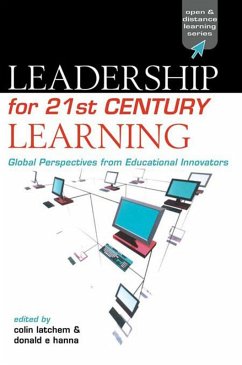
Mindfulness for Educational Leadership in the 21St Century (eBook, ePUB)
Quest for Mindful Leadership in Education Reforms in Uganda
Versandkostenfrei!
Sofort per Download lieferbar
2,99 €
inkl. MwSt.
Weitere Ausgaben:

PAYBACK Punkte
1 °P sammeln!
This book proposes a method for making educational systems and their curriculum leaderships in Sub-Saharan Africaparticularly Ugandarelevant, functional, and generative in the current unfolding of a fast-paced, technology-driven future that prompts questions about educational leadership in a society where many traditional educational systems are failing. The book poses the following question: What might constitute effective leadership in our heightened global nexus of realities often described as globalization? Nonhuman technologies are moving people away from connections that once strengthene...
This book proposes a method for making educational systems and their curriculum leaderships in Sub-Saharan Africaparticularly Ugandarelevant, functional, and generative in the current unfolding of a fast-paced, technology-driven future that prompts questions about educational leadership in a society where many traditional educational systems are failing. The book poses the following question: What might constitute effective leadership in our heightened global nexus of realities often described as globalization? Nonhuman technologies are moving people away from connections that once strengthened human relationships and fostered collective actions. Too many workplace pressures and demands cause educational leaders to function on autopilot without involving others in the process of mindful leadership of educational reform. Focusing on mindfulness, its application in different educational settings, and its advantages for educational leadership, this book argues that contemporary meditation practices and their benefits can inform effective, successful twenty-first-century leadership practices in Africa, particularly Uganda. It draws on numerous theories from literature in the fields of business and management, medicine, psychology, theology, and the social and behavioral sciences. The selected theories represent the growing research grounded in contemporary thoughts on leadership epistemology, with inclination toward the mindfulness that grows out of regular practice of meditation. The book concludes with the argument that collective, mindful educational leadership emerges when all stakeholders are able to participate in the leadership of their institution or school and contribute to the entire systems development. If practiced regularly, mindfulness would conduce to healthier collaborative behavior that would markedly improve Ugandan and other African educational systems. This kind of mindful leadership requires each stakeholder to lead from inside the self and interconnection with others in a profound way. This means leading by listening attentively and intently and embracing one anothers voice nonjudgmentally for the common good.
Dieser Download kann aus rechtlichen Gründen nur mit Rechnungsadresse in A, D ausgeliefert werden.













